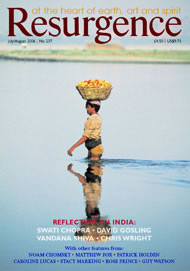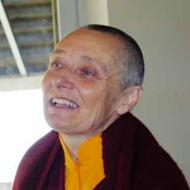"I HAVE MADE a vow to attain enlightenment in the female form – no matter how many lifetimes it takes.” An extraordinary statement, for here is a woman declaring her intent to claim the pinnacle of inner perfection, a declaration made all the more daring because there have been no historical female heads of religions, no recorded female Buddhas.
Venerable Tenzin Palmo intends to remedy all that. I look into her clear, bright eyes which mirror the sky not only in their colour, but in a particular quality of being that is wide open and unbounded. If there is a woman Buddha-in-waiting, this could be Her.
We are sitting in a room that opens out to a magnificent view of the Himalayas – her home and practice ground for the last forty-two years, of which twelve were spent in solitary meditative retreat in a cave 13,200 feet above sea level. A daunting task for the hardiest mountain-folk, let alone an Englishwoman with no prior experience of high-altitude living, in a cave that would be buried under snow in winter, flooded with water during the spring thaw, and constantly endangered by avalanches and wild animals.
What were the odds of her surviving such harsh conditions and continuing her practice unaided by anything but her resolve for enlightenment? Perhaps the same as a fishmonger’s daughter from Bethnal Green in London’s East End taking on Tibetan Buddhist monastic robes and setting forth on a course that would alter the way women, and Westerners, are regarded in this ancient wisdom tradition. Tenzin Palmo did both, and lives to tell the tale.
At eighteen years of age she felt an affinity with Buddhism, strong enough to declare to her mother, “I am a Buddhist!” Soon, Tenzin Palmo, or Diane Perry as she was known then, realised she would have to travel to India if she wanted to explore this further. For it was in India that Tibetan refugees, including prominent teachers of Tibetan Buddhism, had arrived in 1959 after Tibet was invaded by China. Tenzin Palmo arrived in India in 1964 and taught English at a school for young lamas for a short while before meeting her teacher, Khamtrul Rinpoche.
Living in his monastery as the sole nun among 100 monks provided Tenzin Palmo with first-hand experience of the discrimination that restrained women’s access to information that was imparted freely to men. Hungry for instruction, she felt frustrated by the fact that she was kept out of most monastic activities because of misogynistic prejudices. This phase lasted for six years. Then she left the monastery at her teacher’s suggestion to go to Lahaul in the higher reaches of the Indian Himalayas, where she would eventually enter the cave and launch herself into uninterrupted, intense spiritual practice. This period, from 1976 to 1988, brought many trials, inner growth and transformation (as documented by Vicki Mackenzie in Cave in the Snow, Bloomsbury, UK, 1998).
In the hurly-burly of her current life, the isolated cave appears distant, though she holds its serenity within her being. For her cave has now expanded to include the whole world, particularly those women who are looking to engage in spiritual life. Tenzin Palmo has become an enabler, and through the Dongyu Gatsal Ling nunnery that she set up almost ten years ago she is helping to open the door a little wider for women who are going forth upon this difficult path. The nunnery aims to provide nuns with education, meditative practice and the practical skills that will enable them to run nunneries in future. Encouraging more women to become teachers of Buddhism is also a pressing matter.
Despite the gender bias faced by Buddhist nuns, the teachings themselves are gender-neutral, because basically, as Tenzin Palmo explains, “They are dealing with the nature of the mind, how to become more conscious of our thoughts and our inner world, and to see beyond our thoughts to our unborn awareness, which is neither male nor female.” She is keen to go beyond the issue of gender in the meditative space. “If we look into our minds, when we are really sitting and meditating properly, there is no male or female. We all have our innate ignorance, and from that arises our greed and aggressions and jealousies. Male or female, in the end, we are all dealing with our deluded frame of mind whilst aiming to transform it into something that embodies wisdom and compassion.”
Dust-free mirror
What of the quest for enlightenment? Did she not start out with the vow to become a female Buddha? “Well, at the time I made this vow,” she says, “I was so fed up with the male attitude. But to become realised is one thing, to become fully, totally enlightened is another. Even the Dalai Lama doesn’t claim enlightenment – nobody does.
“The easiest way to explain this, without pushing any of these definitions too far, is to think of the mind as a mirror. It is actually clear and reflecting, but comes with dust. When we look at the mind, all we see is thick dust. We don’t see the bright, clear, mirror-like reflection. If you get a pin and make a little hole through that dust, you see there’s a mirror underneath. That’s an incredible breakthrough. You suddenly realise you are not dust. That bright clear shining mirror is there, but there is still dust on it. Until we have wiped away every single speck of dust, we cannot achieve Buddhahood. There are many levels of dust removal; with each there is more mirror and less dust. But until there is no dust at all and no possibility of dust falling again, you are not enlightened.”
Tenzin Palmo’s vivid description of the spiritual process brings to mind a question I have been longing to ask somebody who has experienced monasticism. Are the robes essential for spiritual growth; or is it possible while living in the world, with our relationships and responsibilities, even some fun occasionally? “Of course! If it is not, then spiritual life has no meaning. Ninety-nine per cent of people interested in spirituality these days are not monks and nuns, especially in the West. So if the dharma has any relevance at all, it must be relevant for everybody.
“One of the problems is that people tend to equate the spiritual life with meditation. But that is only one component. In Buddha-dharma, there are six perfections: generosity (openness of heart), ethical conduct, patience under provocation, energy to bring your life in harmony with the spiritual path, and then meditation and wisdom that arises from it. Anything we do is dharma practice provided we bring our attention to it properly. Being a mother and a wife is very much dharma practice if one uses one’s intelligence. Where do you need generosity, patience and so on, more than when bringing up a child? All these qualities are needed for the heart to open up. It is not just a matter of sitting on a cushion and meditating. If we learn how to be present, how to be here, then whatever we do can be dharma practice. It doesn’t matter whether we are in a monastery or workplace or at home, it is the same. The mind is the same. The mind doesn’t have a shaved head!”
WE SPEAK ABOUT how the internalisation of prejudices by women themselves leads to their perpetuation. I tell her how crucial she has been in this regard, because she came in from the outside and could challenge both men and women to question their ingrained prejudices. “Oh yes,” she says. “I think it is significant that I was born as a woman, and a Western one at that.”
The latter part of this remark is important because Buddhism’s contact with the West has thrown up a host of issues that have to do with reinterpreting ancient wisdom in contemporary contexts, with sifting out and crystallising true insights from cultural accretions and ossifications. People like Tenzin Palmo are playing a vital role in this new turn of the wheel of dharma, by acting as bridges between the old and the new, the eternal and the modern.
As our conversation draws to a close, Tenzin Palmo goes over to the glass doors that let the Himalayas into the room. Peering at the construction work going on in the nunnery, she mentions how she would love to see all this completed. I think I detect a yearning, for the cave, for a return to the life of contemplation. As I leave, she puts her arm around me in an unexpected gesture of warmth. Her eyes are quiet and deep once more. Right here beside me, she is in her cave – in quiet awareness of her innermost reality.
For more information about Ven. Tenzin Palmo and the Dongyu Gatsal Ling nunnery, visit








